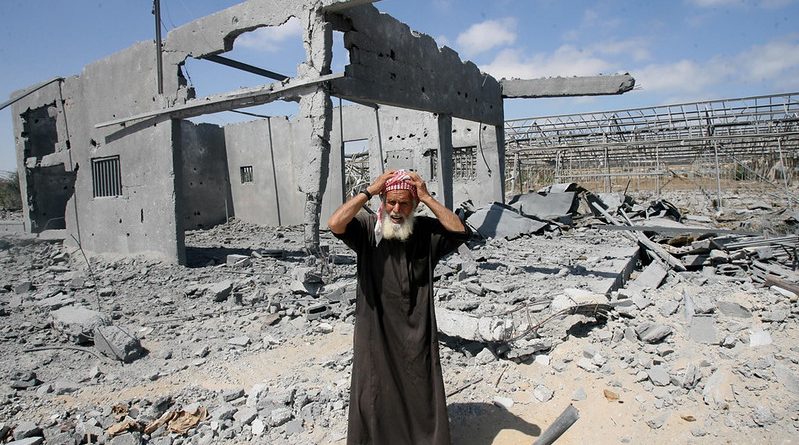Focus on Civilians in Conflict: Elderly and Disabled
Stephanie Miller
Editor in Chief
On February 11, 2020, soldiers from the Syrian army opened fire on a group of elderly women near Kafr Halab in western Aleppo. Members of the elite 25 Division, or “Tiger Forces”, killed the women as they returned to a house to collect clothes and other belongings before fleeing regime advancement, according to local reports cited by The Telegraph.
“If confirmed, a Syrian army attack on local residents trying to flee violence would belie the claims by the Syrian and Russian governments that their offensives solely target fighters,” reports Bethany Brown with Human Rights Watch. “It would also be a disturbing case of targeting older women in conflict, a tactic which the UN has found is used by armed groups in other contexts to forcibly displace communities.”
Despite precedents set by President Bashar al-Assad’s regime and other parties to the conflict in recent years, international humanitarian law views the elderly as a protected class of persons not participating in wartime hostilities. The International Committee of the Red Cross (ICRC) notes that the elderly enjoy such protection not only as civilians but also as disabled persons, as their weakened condition “renders them incapable of contributing to their country’s war effort.” Likewise, the United Nations recognizes persons with disabilities as a vulnerable group: of the estimated one billion persons with disabilities across the planet, some 80 percent live in developing countries where they are among the most marginalized in any crisis-affected community.
UN Deputy Secretary-General Amina Mohammed urged support to persons with disabilities in conflict and humanitarian settings at the opening ceremony of the Doha International Conference on Disability and Development in December 2019, according to UN News. Mohammed pointed to the UN Central Emergency Relief Fund’s recent classification of persons with disabilities as a priority area and the UN Security Council’s adoption of its first resolution on protection of persons with disabilities in armed conflict.
“We have seen several positive developments,” Ms. Mohammed explained. “Now we must work together to bring the commitments of these documents into action.”
Unfortunately, advocacy at the organizational level has not translated into action on the ground. Although UN endorsement often gives momentum to international efforts to address humanitarian crises, it often comes too late for the people who need it most.
“The woefully underfunded United Nations humanitarian response exacerbates their risks, as many people with disabilities aren’t getting even their basic needs met,” senior disability rights researcher at Human Rights Watch Emina Ćerimović states, describing the status of disabled persons in Cameroon.
Vicious cycles of separatist violence in Cameroon’s Anglophone regions have claimed an estimated 2,000 lives and displaced almost half a million civilians, but people with disabilities and the elderly are at greatest risk of abuse because they are often unable to flee. Attacks against people with disabilities and older civilians often result in death, violent assault, and kidnap by government forces and armed separatists.
Violent conflict also deprives disabled and elderly persons access to lifesaving health and medical care. Mujeeb R. Awrang with the Afghanistan Times reports that four decades of war have disabled thousands of Afghans.
“The longest violence has, directly and indirectly, inflicted severe impairment on people with some of them with no eyes, no hands, no legs and also hearing problems — while several others of them incapacitated due to lack of access to the medical facilities,” Mujeeb writes. “Many cases of structural birth defect, spina bifida, cleft palate, clubfoot, and congenital dislocated hip registered in the country, as the health officials have been struggling to provide medical facilities due to prolonged instability in Afghanistan.”
Struggles pertaining to economic life can also compound the consequences of political conflicts. In Venezuela, the elderly and disabled are described as an ‘invisible class’ who are impacted the most by economic crisis.
“Elderly people in crisis zones are completely invisible,” elderly needs field researcher Natalia Rodriguez to the New Humanitarian. “They are completely ignored. Ninety-nine percent of the [elderly Venezuelans] we spoke to received absolutely zero humanitarian assistance.”
The New Humanitarian also reports that Venezuelans over the age of 65 comprise a significant percentage of the population fleeing the country. Lack of familial support or sufficient aid from government programs and charitable organizations exacerbates problems that younger, better-abled refugees already face, such as access to food, healthcare, and capability of movement.
Even in post-conflict societies, elderly and disabled persons often feel the effects of war long after the dust settles. A recent report from the Oxford Institute for Population Ageing describes how the 1994 Rwandan genocide continues to impact aging populations in the country, finding that throughout the course of their study “Older people were almost entirely absent from the public sphere. Although they are perceived to be ‘wise’ and have a huge yearning to retain agency, they lack a political voice.”
Access to social assistance programs for Rwanda’s elderly is complicated by “biographical pain and poverty” associated with the genocide. Communities still face social tensions compounded by loss, as those who were complicit in aiding and abetting genocide are being released from prison and return to live in the same villages affected by the massacres. The Oxford Institute found that in addition to issues of age, ill-health, and disability that are often lumped together and not dealt with as individual problems requiring specialized solutions, local community tensions and residual politics leave even the most vulnerable elders unsupported.
As global conflict and disorder continues to persist across the globe, states have a responsibility to ensure the continued security of civilians in conflict. Although the elderly and disabled are considered protected classes, millions still suffer from abuse, discrimination, social and political exclusion, negligence in humanitarian settings, and denial and rationing of health care each year. So long as the rights of elderly and disabled persons continue to be infringed upon, their neglect will remain an under-documented phenomenon.

